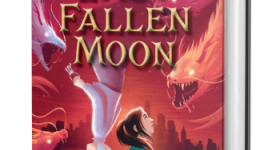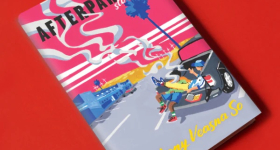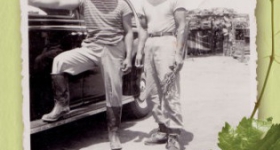Grave
By Justin Chin
In the harsh glare of an easily
reprehensible life. The channel changer is lost
in the crack of an infinite sofa.
Everything falls apart, everything breaks
down, torn into a million
fragments, Jericho everyday.
I want to be the blameless
victim in this canceled puppet show,
the marionette every mother loves, the one
souvenirs are modeled from.
(In that lifetime, Elton John will write mushy ballads just
for me. Michael Jackson will want to be my best friend. He’d
take me to the Neverland Ranch, and by the llama feeding trough,
he’d say something like, “You’re a great guy, don’t give up,
stay positive!” And I’d say, “Michael, you fucking idiot, I am
positive!” And he’d say, “Oh, you’re so funny! Would you like
to touch Bubbles?”
And I would.)
In the crux of my hollow innocent youth,
I believed that my teddy bears had feelings.
To cure me of this, my guardians made me give
them to the church missionaries’ children.
Scrubbed-clean rosy-cheeked blonde kids who smelled
of sweat and talc, who were in constant
wide-blue-eyed bewilderment as to why
they were profusely perspiring in the tropics,
instead of living out some winter wonderland Bobsey Twins
fantasy, who were oblivious
to their parents’ desperate efforts
to save the dusky masses, ignorant enough
to believe in the secret lives of stuffed animals.
I could not eat animal crackers
because I did not want to hurt the poor things;
but, braised the right way, I could eat
any part of a pig, starting with the head,
working on the soft flesh around the eyes,
savoring its raspy tongue with a dipping
sauce of ginger, chilies and lime.
Oh blameless innocent victim.
What measures a lifetime?
I used to have this theory about how
much life a human body could hold.
It all had to do with the number
of heartbeats. Each human is assigned a number
determined by an unknown power cascading
over the dark waters of the unformed Earth.
For some, it was a magnificently high number,
seen only in Richie Rich comics, and for others,
it was frightfully low, like twenty-six.
No bargaining, no coupons,
no White Flower Day sale, no specials. Once
you hit your number, you croak.
I imagined the angels in heaven
and the demons in hell gathering to watch
the counters turn, like how I enjoyed watching
the speedometer line up to a row of similar
numbers, and especially when the row of
nines turned into
the row of zeros.
Oh blameless innocent victim.
What measures eternity?
An eternal damnation. An everlasting love.
I could not imagine the night sky
stretched out forever, so I decided that it came
to an end at some point, by a velvet rope it ended
and beyond that rope were row after row of cushioned seats,
a majestic cosmic theater,
playing every movie I can remember.
I want to be able to evoke
those blameless and innocent days, to revel
in their ignorance and goodness
as if they have the power
to protect and to heal,
and to strengthen,
and to bring me to safety
long after all other resources
were exhausted.
But I emerge anew in the wreckage,
blinking in the sunlight,
the residue of salt water in my belly.
You know what they say,
God never closes a door before making sure
that the windows are barricaded
and the fire escape is inaccessible.
I used to know how to stop the revolution of planets.
I used to know how to save the world.
Now, I don’t know anything anymore.
"Grave" from Harmless Medicine © 2001 Justin Chin. Used by permission of publisher.
 In late December, the Asian American literary community lost Justin Chin, a prominent and beloved Bay Area writer. Chin, who first appeared on the scene as a performance artist, published his first book of poems, Bite Hard (Manic D Press) in 1997, followed by six more books, including several books of poetry and prose. As a queer Asian American immigrant writer, Chin's work explored these facets of his identity in poems and essays that were often funny, raw, and vulnerable all at once. Chin was also a teacher and mentor to many and an advocate for the communities he belonged in, which included being a strong supporter of Hyphen.
In late December, the Asian American literary community lost Justin Chin, a prominent and beloved Bay Area writer. Chin, who first appeared on the scene as a performance artist, published his first book of poems, Bite Hard (Manic D Press) in 1997, followed by six more books, including several books of poetry and prose. As a queer Asian American immigrant writer, Chin's work explored these facets of his identity in poems and essays that were often funny, raw, and vulnerable all at once. Chin was also a teacher and mentor to many and an advocate for the communities he belonged in, which included being a strong supporter of Hyphen.
We invited some of Justin Chin's friends, colleagues, and those touched by his work to share remembrances with us in tribute and celebration of Chin's life. We join them in mourning the loss of his light from our community.
Christine Hyung-Oak Lee, author of Whole and Golem of Seoul (forthcoming):
I met [Justin] at Mills during my first semester in the MFA program in 2004. He was my workshop instructor, and he wrote such a searing, unforgiving, critique (really criticism) of my story that he made me cry after class. He said it was false and self conscious and really just horrible. It was what I needed for my writing, and what he said was true.
I chatted with him during his office hours, and that was the point at which we became friends. He was truthful and kind. He was gentle yet sarcastic. I kept in touch with him throughout the years--he always said just the right thing.
When I was a low point in my writing, he wrote back, 'Self doubt, paired with perseverance, makes for the writer's best tool: a bullshit detector for the self.'
He was always there with generosity and kindness. And he always paired his kindness with a sarcastic tough love that lifted me out of any well. He was my friend, my mentor, and a brilliant poet and great soul.
He loved his cat, and was very sad when his cat died. He had such great compassion. When I organized a fundraiser for a friend without health insurance who had Hodgkin's, he rallied his network to contribute literary auction items (e.g., artwork, critiques, books). He always stepped up to help others.
When my daughter was born a couple years ago, he wrote her a poem, letterpressed it, and sent it to me. Who would do such a lovely thing? Justin.
He left poetry about a year ago and became an EMT. He said he'd given up on the writing life. Poetry was sad then, but even sadder now.
Claire Light, cofounder, Hyphen magazine:
I didn’t know Justin Chin well at all -- more in passing, really -- but he studded my landscape like raisins. My first six years in San Francisco, he lived five doors down from me. We never once ran into each other on the street, but I frequently saw him entering his ground floor apartment. There was a kind of mystery about the inside of that semi-basement. Once, a friend took me through a guided meditation, and when she guided me down into "some sort of entrance underground,” which was to represent the entrance to my subconscious, I immediately envisioned Justin’s door. I went through that door in my mind and found myself at the top of a staircase. “Now, at the bottom of the staircase there will be some sort of cavern,” my friend instructed me. “Find a source of water.” The water represented my creativity. But I couldn’t go down the stairs or find the cavern, because the stairs were flooded up to the top step. That was Justin’s apartment.
Everywhere you wanted to be, Justin was there; in another room maybe, but there. He’d been an artist-in-residence everywhere I was, or wanted to. He taught at State when I went to grad school there, but I wasn’t allowed to take poetry. Mostly, when I went to see him read, I just missed him; I only ever got to see him read by accident. But somehow, he knew who I was and what I did anyway. The first time I attended Writers with Drinks after a long illness, Justin was there, watching. I hadn’t seen him in years, but he interrupted my conversation and asked me detailed questions about what I’d been up to, then declined to have drinks with us.
Justin was one of the mouthpieces of the gods of literature; his distant intimacy made absolute sense to me. His clipped, slightly accented, dry-as-fuck delivery was a distilled version of my grandfathers’ and uncles’: the Platonic ideal of an overseas Chinese man (even if he wasn’t entirely Chinese) cocking his eyebrow at your ridiculousness. I had no idea until yesterday that he was only a year older than I. That’s not right somehow; or maybe it’s just how this avatar chose to make it.
Minal Hajratwala, author and writing coach:
When I think about Justin Chin, I think about generosity. Possibly one of the very last things he wrote, a few weeks ago, was a blurb for a book from our press, a lovely endorsement for a poet he never met that itself reads like poetry.
This density of image and language and attention is what I'll always associate with Justin, one of the very first queer Asian poets I knew of before I knew him, someone I followed even in the years before "following" was a thing we did to each other on computers, when it meant actually showing up in person at events, applauding and fangirling and buying books. Nearly two decades ago, he did a solo World AIDS Day performance at the Asian Art Museum and because he was amazing, they invited other poets to do it each year and that's how I got invited to do my own solo show, following in the path he made. In the long years it took me to write my first book, I kept a quote from his poem “History of Geography” on my desk, to remind me what we write up against and how important it is to insist on the complexity of our experience:
"They want to distill me,
take the queer sky out of my body..."My copy of BITE HARD is in a box on another continent so I regret that I can't quote more of the poem, only the bit I've stored in a Word document for more than a decade. More than that, I regret that I never told him how his words, his example, sustained me through a difficult writing period. I have an email just hours ago from someone following up because he recommended my book for a prize. I meant to thank him for that, too.
Of course the real way we thank writers is to read them, to share their work, to immortalize them. The powerful performances of Justin's that I remember from the 90s and early 2000s took place before YouTube and are probably stored on VHS tapes somewhere, and maybe there will be a project to find and archive and convert them, though video won't capture the energy that zinged between him and his audience, his beloved and also infuriating communities. But his words echo throughout the world of Asian American poets, and his books are still out, still as hot and gorgeous and radical as when he wrote them, queer and Malaysian and American and San Franciscan and everything/everything. He told me, as he must have been telling everyone, that he'd given up on writing for good. "I've pretty much thrown in the towel/beach blanket/loofah," he said in a recent email — and see how the way he wrote it made me smile and broke my heart at the same time, because writing or not writing, Justin will be a poet forever.
from "The Fisting Bottom":
"I have turned myself inside-out to turn
my understanding right-side-up or down; I have
wielded my weapon with cunning & grace & skill.
I have lived past the point
of impact..."
Barbara Jane Reyes, poet and author of To Love as Aswang:
Justin Chin was my teacher, and for that, I am so grateful. I am honored to have shared some meaningful spaces with him. He probably didn't know that his ferocity emboldened and pushed me, and that I wish I could be as brave as he was. He probably didn't know I consider him a mentor. He also probably didn't know that revisiting his book Gutted has really helped me through grieving for my own father. Justin was kind to me. I can't thank him enough.










Comments